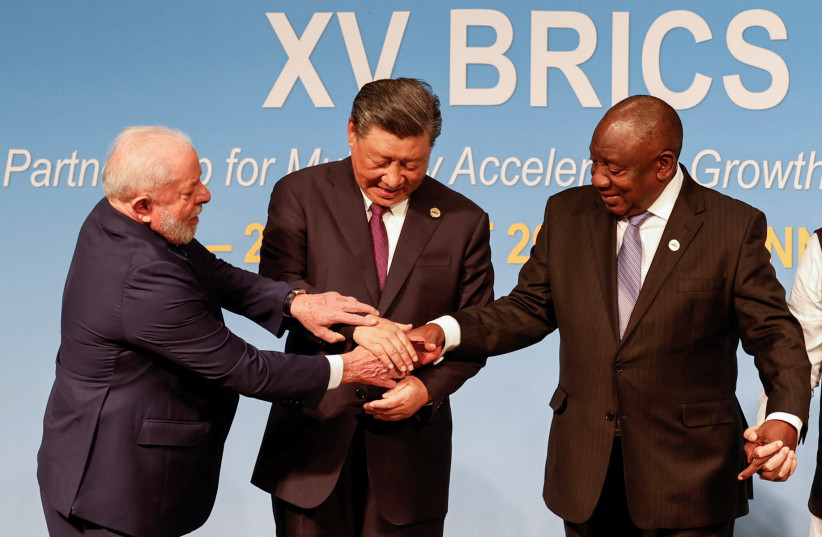Thirty years ago, the consensus of many analysts looking at the Middle East from the West was that oil in the Gulf was one of the key interests of the United States and other countries in the region.
Today, the realities of the region, at a center of geopolitical shifts, have made it a key for diplomatic initiatives. One of these initiatives is the prospect of Israel-Saudi Arabia normalization.
However, it is not the only big story in the region. Saudi Arabia is also making important moves in regards to Iran and other countries are joining the trend.
Saudi Arabian Crown Prince Mohammed bin Salman’s comments in a US television interview that his country was moving steadily closer to normalizing relations with Israel is a symbol of the new diplomatic era.
Perceptions of the Middle East
The shift in the spotlight is important. For many years the Middle East was perceived as a problem in the West. This included discussions of conflict and also the rise of terror and extremism. Off-hand comments by US leaders describing the region as soaked in age-old conflicts, or wasting blood and treasure, meant that perceptions of the region were skewed to see it as a center of “endless wars” and an area the West should withdraw from.
Into the vacuum of withdrawal has come a new regional consensus. This means many countries, particularly in the Gulf, have moved forward with diplomatic initiatives of their own. Qatar, for instance, was a key broker behind discussions that brought the Taliban back to power in Afghanistan. They also were involved in the recent deal between the US and Iran regarding Iran trading prisoners it had held as hostages.

Saudi Arabia and the UAE have also played a key role in carving out a new role in the regional order. The important comments by Saudi Arabia’s crown prince this week about potential normalization with Israel and also Iran’s nuclear program illustrate how Riyadh is positioning itself in the region.
In addition, the G20 discussions about a new economic corridor and the third anniversary of the Abraham Accords are all part of this new diplomatic economic era in the region. Today, the region is not seen as just a Western interest regarding oil trade. It is a network that connects Asia and the West. It is a key part of global trade.
The Prize: The Epic Quest for Oil, Money and Power
More than 30 years ago, a book by Daniel Yergin was published called The Prize: The Epic Quest for Oil, Money & Power. This was a history of the global petroleum industry from the 1850s to 1990. The book was prescient in a sense. It opened a curtain on the struggles that underpinned the Gulf War. That helped set in motion other crisis, such as the conflicts in Iraq that led to the 2003 invasion. It also weakened Iraq, and Iran filled the vacuum left by the Saddam regime’s demise. Lest we forget that the Iran-Iraq War dominated the 1980s. In that era, Iraq had Soviet weapons but was quietly backed by the West after the Iranian Islamic Revolution.
NOW LET’S fast forward to 9/11 and the extremism let loose by the rise of al-Qaeda and the global war on terror. For many years, the region was seen as primarily a place where Western concepts such as “counter-insurgency” became the norm.
Western powers retooled their militaries after the 1990s also, focusing on special forces and expensive weapon systems such as the F-22. The US also invested in drones such as the Reaper, good for precision attacks on terror groups, but not of much use against an airspace where other warplanes are present.
Now, in the last half decade, the US has sought to shift its national defense policy to focus on “near-peer” threats, meaning Russia and China. The Middle East was perceived by the Obama and Trump administrations as an area where the US had focused too much.
Now we get to 2023, and the US administration is focused on Saudi ties and also the potential for normalization. The US is also focused on Iran. Washington has shifted some focus away from the Israel-Palestinian conflict.
Thirty years after Oslo this makes sense. The “conflict” was a huge drain on resources and time. Now the concepts being discussed are more pragmatic.
Pragmatism underpins the Gulf’s policies as well. That includes ties with India and Eastern Mediterranean states and also initiatives such as I2U2 (India, Israel, US, UAE) and the Negev Forum of regional states.
In fact, “regionalism” is the new term being used in Washington and the Middle East. While some may see regionalism as an extension of the Abraham Accords, Riyadh and others also see it as an opportunity to heal ties with Damascus.
The “prize” today in the region is not oil, but diplomacy. That is why the Arab League is working to reintegrate Syria, and the GCC countries in the Gulf are doing more outreach through meetings in the US, and with China. Many countries in the Middle East are also seeking to join BRICS and even the Shanghai Cooperation Organisation.
These are all “prizes” similar to the old story about oil in the region. If one looks across the Middle East today, the real story about Saudi Arabia’s policies is that regional diplomacy, linking the Middle East to the world, is the centerpiece of global shifts today.
